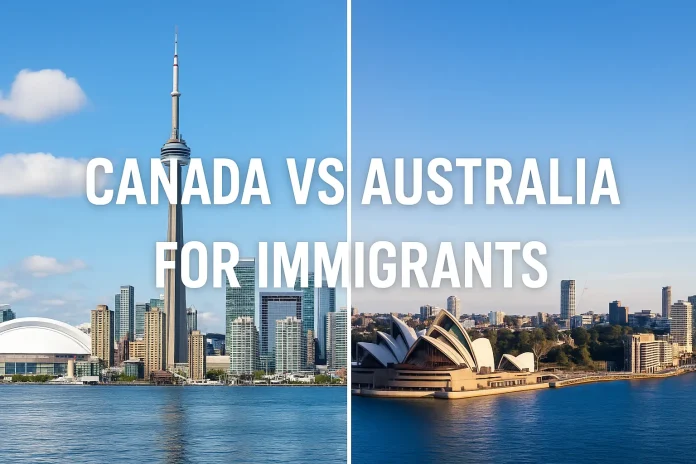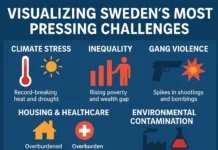
Canada and Australia are among the world’s top choices for immigrants, known for their high living standards, strong economies, and structured immigration systems. Both countries offer attractive options for those seeking better jobs, safer environments, or long-term residency. So, how do you decide which country is better for you? This article compares the two across five key areas that most matter to immigrants.
Which Country Offers a Better Future for Immigrants?
Immigration Policies and Pathways
Canada
Canada uses a well-defined, points-based system to attract skilled immigrants. The Express Entry program is the most popular, assessing candidates based on age, education, language skills, and work experience. In addition, the Provincial Nominee Programs (PNPs) allow provinces to nominate candidates who meet local labor needs. Canada also offers generous family sponsorship and refugee programs. New policies increasingly focus on welcoming immigrants to smaller towns and rural areas.Australia
Australia also relies on a points-based system and offers various skilled migration visas, such as Subclass 189 (independent skilled) and Subclass 190 (state-sponsored). Like Canada, the country values English proficiency, qualifications, and work experience. Australia’s Skilled Occupation List guides applicants toward in-demand sectors. Employer-sponsored visas and family stream migration are also available.Verdict:
Both systems use a structured, merit-based approach, but many recognize Canada as more transparent and easier to navigate. It also offers more pathways to permanent residency and citizenship.Job Opportunities
Canada
Demand is rising in healthcare, technology, construction, and transportation. Skilled workers are in high demand across Ontario, Alberta, and British Columbia. However, newcomers may initially face barriers like credential recognition and local experience requirements.Australia
Australia actively seeks workers specializing in nursing, engineering, education, construction, and IT. The government encourages migrants to settle in regional areas through additional visa points and incentives. Australian employers tend to value qualifications and work experience gained in English-speaking countries.Verdict:
Both countries have strong job markets for skilled professionals, but Australia may offer quicker entry into some professions, while Canada tends to provide broader long-term support.Cost of Living
Canada
Living costs vary widely. Major cities like Toronto and Vancouver are expensive, especially for residents, but smaller urban areas and provinces offer more affordable alternatives. Healthcare is publicly funded, reducing long-term costs.Australia
Australia also has high living expenses, particularly in Sydney and Melbourne. Income levels tend to rise in step with the cost of living. Public healthcare (Medicare) is accessible, and some temporary residents may require private coverage.Verdict:
Both countries have expensive cities but offer more affordable options in regional areas. Your budget and preferred location will play a leading role. It’s a tie.Public Services and Support for Immigrants
Canada
Canada provides universal healthcare to permanent residents, access to free public education, and a wide range of settlement services such as language classes, employment support, and housing assistance. Newcomers often encounter government and community-led integration programs.Australia
Australia also offers quality public healthcare (Medicare) and free public education for citizens and permanent residents. Migrants can access publicly funded employment programs and language training. Some programs, however, require extended residency before benefits begin.Verdict:
Canada leads slightly due to its newcomer-focused settlement services and quicker access to healthcare.Quality of Life and Safety
Canada
Canada ranks high in safety, education, and overall happiness. Its society is multicultural and tolerant, with strong protections for human rights. Harsh winters in many parts of the country can be a downside for some.Australia
The country is known for its bright climate, beautiful coastlines, and relaxed living. It consistently ranks high in life expectancy, healthcare quality, and work-life balance. Crime rates are low, and cities are generally clean and safe.Verdict:
It comes down to climate and lifestyle preferences. Canada may suit those who enjoy urban diversity and cooler seasons, while Australia is ideal for warm-weather lovers and beachgoers.
Conclusion
So, which destination offers a better future for immigrants: Canada or Australia?
• Choose Canada if you value clear immigration pathways, extensive settlement support, universal healthcare, and a strong sense of community diversity.
• Choose Australia if you prioritize warm weather, faster job access in some sectors, and a laid-back lifestyle with a strong work-life balance.
Both nations are among the best places in the world to build a new life. Your personal goals, profession, and lifestyle preferences will be the ultimate deciding factors.
Frequently Asked Questions (FAQs)
Is it easier to immigrate to Canada or Australia in 2025?
Canada mainly offers more straightforward and flexible immigration pathways, notably through programs like Express Entry and the Provincial Nominee Program. Australia has strong options, but the points-based system can be more competitive and complex.
Which country is more affordable for newcomers?
Both countries have high living costs in major cities, but regional areas in Canada and Australia offer more affordable housing and everyday expenses. Canada tends to have lower healthcare costs due to its universal healthcare system.
Which country offers better healthcare for immigrants?
Canada provides universal healthcare free at the point of use for permanent residents. Australia also has an excellent system (Medicare), but some visa holders may need private insurance initially.
Can immigrants get citizenship effortlessly in Canada or Australia?
Both countries offer pathways to citizenship. In Canada, you can apply after 3 years of residency. In Australia, the standard requirement is 4 years. Both countries require language proficiency and a citizenship test.
Where are the best job opportunities for immigrants in 2025?
Canada has a growing demand for healthcare, tech, and skilled trades. Australia offers opportunities in engineering, IT, education, and construction. Both nations have strong labor markets for experienced professionals.
- The 10 Biggest Problems in Australia
- The 10 Biggest Problems in Canada
- Renting in Canada Is Becoming Unaffordable—Here’s Why














